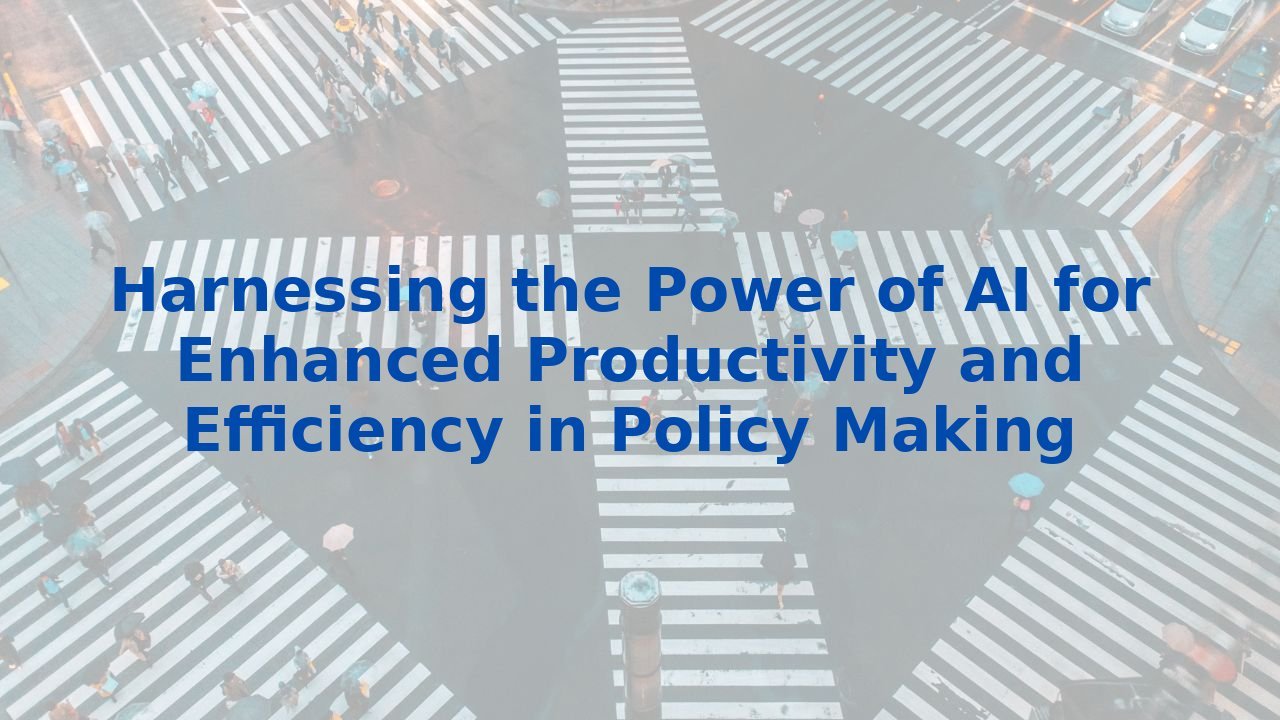Harnessing the Power of AI for Enhanced Productivity and Efficiency in Policy Making
Revolutionizing Policy Making with AI Tools
In the dynamic landscape of policy making, staying ahead demands innovation, efficiency, and insightful decision-making. Artificial Intelligence (AI) is rapidly transforming various industries, and policy making is no exception. By leveraging AI tools like ChatGPT, policy makers can expedite research, improve communication, streamline tasks, and ultimately, enhance productivity. AI can assist with data analysis, provide valuable insights, and automate routine processes, freeing up policy makers to focus on strategic and impactful work.
Tasks Policy Makers Can Accomplish Using ChatGPT
Drafting and Editing Documents
Creating policy documents, reports, and communication briefs can be time-consuming. ChatGPT can assist in drafting initial versions of these documents, highlighting key areas of focus, and even suggesting improvements. This greatly reduces the time spent on writing and editing, allowing policy makers to allocate more time to policy analysis and decision-making.
Conducting Research
Policy making requires a solid foundation of knowledge on various issues. ChatGPT can help gather and summarize reports, legislation, academic papers, and statistical data. It can also provide context and explanations for complex topics, helping policymakers understand nuanced issues quickly and efficiently.
Generating Public Communication
Effective communication with the public is essential for transparency and trust. Policy makers can use ChatGPT to draft speeches, press releases, and social media posts, ensuring that their messages are clear, consistent, and engaging. This ensures that policy makers can maintain a proactive stance in public discourse without additional strain on their schedules.
Prompts to Optimize ChatGPT Utilization for Policy Makers
Here are a few prompt ideas that policy makers can use to maximize the benefits of ChatGPT:
For Drafting Policy Documents
"ChatGPT, draft a policy brief on the economic impacts of renewable energy adoption."
For Conducting Research
"Summarize the key findings from the latest report on climate change regulations."
For Public Communication
"Create a press release announcing the new housing policy initiative."
For Public Statements
"Draft a speech outlining the benefits of the new healthcare reform to be delivered at the upcoming conference."
Other AI Tools Beneficial for Policy Makers
Data Analysis & Visualization Tools
AI tools like Tableau and Power BI offer advanced data analytics and visualization techniques. They empower policy makers to interpret complex data sets and draw meaningful insights, which can be shared with stakeholders in an easily digestible format.
Natural Language Processing (NLP) Tools
NLP tools such as IBM Watson and Google's BERT can analyze public opinions, sentiment analysis, and policy impacts. These insights enable policy makers to gauge public sentiment and adapt policies accordingly, ensuring a higher level of public approval and engagement.
Automation Software
Automation tools like UiPath and Zapier streamline repetitive administrative tasks, such as scheduling meetings, sifting through emails, or managing databases. This automation enables policy makers to focus on more strategic, high-level tasks, enhancing overall productivity.
Future Prospects of AI in Policy Making
The journey of AI in policy making is just beginning. In the future, AI may assist in predictive analysis, forecasting the societal impacts of policies before they are implemented. AI algorithms could simulate different policy scenarios, providing evidence-based recommendations to policy makers. Moreover, advanced AI chatbots might handle more complex, real-time interactions with constituents, making governance more transparent and interactive.
Importance of Embracing AI for Policy Makers
The adoption of AI is not merely an option but a necessity for modern policy makers. AI won't replace policy makers; rather, it will enable those who harness its power to outpace those who do not. By integrating AI tools, policy makers can achieve greater efficiency and productivity, leading to more substantial professional accomplishments and potentially higher earnings.
As AI continues to evolve, it will empower policy makers to tackle larger, more sophisticated challenges with confidence. The shift towards AI-driven policy making is not about substitution but augmentation — enhancing human capabilities to deliver better outcomes for society. Adaptability to this technological revolution ensures policy makers remain relevant and effective in a rapidly changing world.
Are you looking for over 15 different ways Policy Makers can use AI, 1000s of additional prompts to support you with your work, video training and more? Complete AI Training supports Policy Makers to learn AI and to always be up to date on AI. Discover our resources at Complete AI Training. Also refer to our book that's available on Amazon Kindle and Amazon Paperback.



